「World Barista Championship」で戦うことの意義【インタビュー記事】
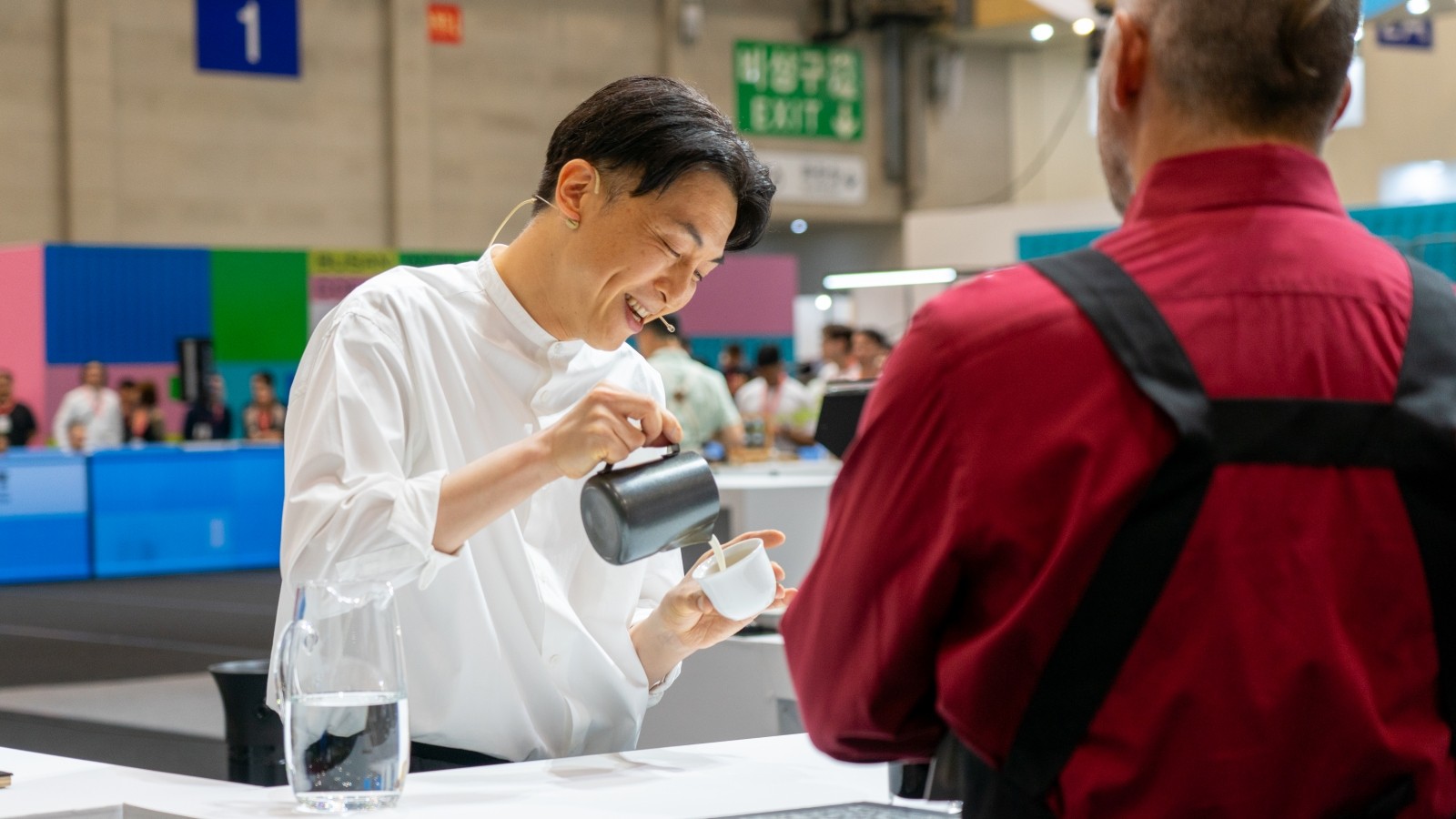
2024年5月に韓国で開催された「ワールドバリスタチャンピオンシップ(WBC)」、日本代表として出場し、3位を獲得することができました。この大会終了後、コーヒーアプリ「CROWD ROASTER」にて大会についてのインタビューを受けました。転載許可をいただき、ここではそのインタビュー記事を、掲載させていただきます。
2023年の「ジャパンバリスタチャンピオンシップ(JBC)」にて、自身3度目の日本チャンピオンに輝いた石谷貴之バリスタ。2024年5月に韓国で開催された「ワールドバリスタチャンピオンシップ(WBC)」に日本代表として出場し、世界の実力者揃いのバリスタの中で、自己最高位となる第3位を獲得しました。石谷さん自身にとっては、2018年、2022年以来3度目の世界挑戦となった今大会。これまで以上に得られたものの多い大会になったと、石谷さんは語っています。試合を終えて約2週間ほどが経ったこの日、じっくり振り返っていただきました。
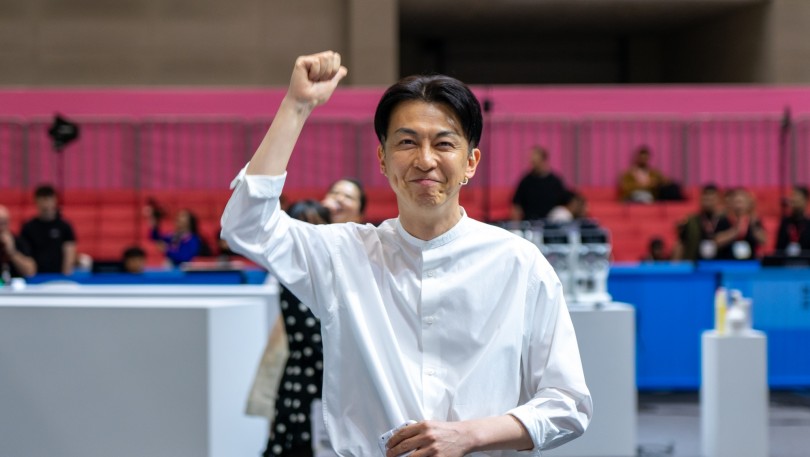

参加者の努力で作られた「WBC」の雰囲気
──まずは、WBC(ワールドバリスタチャンピオンシップ)での3位入賞、おめでとうございます。率直な気持ちをお聞かせください。
石谷:ありがとうございます。成績としては3位なので、正直そこは悔しい思いがあります。ただ、競技の内容やこれまで取り組んできたことに関しては満足しています。できることは滞りなくできましたし、順位についても気持ちのモヤモヤなどはまったくなく、とても納得いく大会でした。
──これまで出場された2回との違いはありましたか?
石谷:もしかしたら、3回目なので周りがしっかり見えるようになったからかもしれませんが、とても雰囲気がよく、他の選手たちも口を揃えて「今回はすごくいい大会だった!」と言っていました。みなさんが大会を良くしようという思いで運営されていたことは間違いありません。
──大会の動画などをみても、観客の盛り上がりやフレンドリーな雰囲気はすごく伝わってきました。
石谷:本当に今回は一体感のある大会で、選手だけじゃなく観客もジャッジも運営も4日間すごく楽しんでいて、いい大会だったと思います。
──ファイナリストには、アジア、オセアニア、ヨーロッパとさまざまな国のバリスタが残っていましたね。
石谷:ファイナリストに限らず、予選ラウンドの段階からみんなでコミュニケーションを取ろう、というような雰囲気でした。世界大会はそこが一番楽しいというか、いろいろな方と知り合えるということは、大会に出場する意味のひとつでもあると思っています。
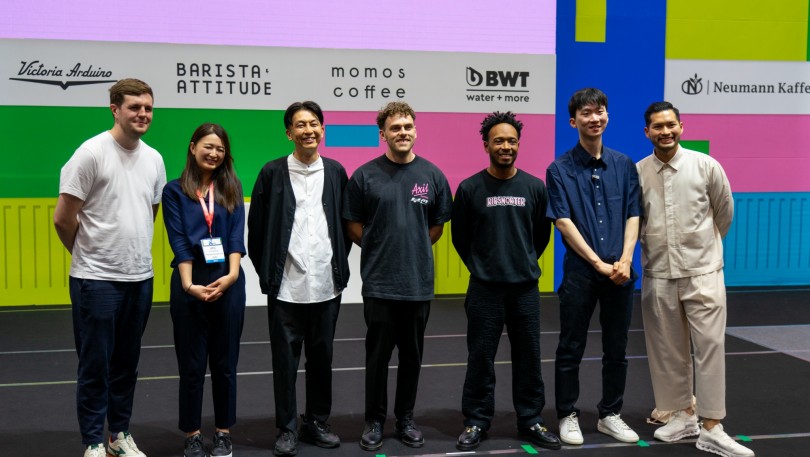

バリスタが表現したいものを自由に作れる時代
──2023年9月のJBC優勝後のインタビューから約半年が経ちました。この間、今大会に向けてどんな準備をされてきたんでしょうか?
石谷:開催時期が5月ということで、ニュークロップが間に合うか間に合わないかという微妙なタイミングで、使えるコーヒーが直前まで読めない状況だったんです。
生産者とやりとりしたり、(今回のチームの一員である)スイスのMAMEに協力してもらってコンタクトしてもらったりもしましたね。大会のタイミングでどういうコーヒーが使えるかを見極めることは一番神経を使ったところです。あとは、プレゼンテーションをどういうかたちにするかを半年間ずっと考えていました。
──結果的に、大会で使われた豆はJBCの時と同じ農園・品種でした。
石谷:はい、ニュークロップでその農園にするか、他の農園にするかというところを、3月くらいにカッピングして決めていきました。JBCと同じ農園にしたのは、自分の出したい味や、自分が今好きなコーヒーを使いたいということです。
他の農園のコーヒーもよかったんですけど、日本大会の時から飲んでいて、自分のプレゼンテーションをしっかり伝えるためには、この2つが一番いいかなと思って選びましたね。
──プレゼンテーションのテーマ自体も、JBCと同じでしたよね。
石谷:「理想が現実になった時が一番幸せな瞬間だ」というテーマ自体は変えていません。バリスタの職業的な部分だけではなく、どんなドリンクを作ることが理想かということ。その理想が、自分で意図的に作れるようになったということを「インテンショナル・クラフト」という言い方をしていて、いまこの時代はバリスタにとってすごく楽しい、ということを伝えたかったんです。
──一貫したテーマで挑んだ、ということですね。では、ひとつずつ振り返ってみたいと思うのですが、まずはエスプレッソについて。
石谷:エスプレッソは、パナマのフィンカデボラのゲイシャ16gと、コロンビアのフィンカミランのカトゥーラ2gをブレンドして作りました。ストーンフルーツやトロピカルフルーツなどのフレーバーが感じられます。目指したのは「フレーバーとタクタイルのパーフェクトなバランスを作る」ということです。
──次がミルクビバレッジ。ライスミルクとラクトースフリーミルクを積極的に用いられていました。
石谷:2022年から大会で植物性の牛乳が使えるようになったので、一度試してみようということでライスミルクを試していました。実際、今回のドリンクはライスミルクもラクトース(乳糖)フリーも相性が良かったので、大会でも使おうと考えました。といっても、最初から使おうと決めていたわけではなく、これも検証しながら、意図的に味を作る、というところを表現しています。
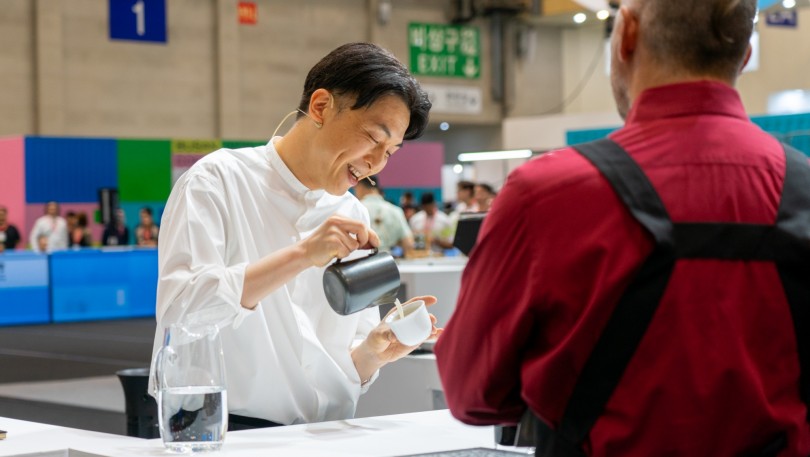

──米由来のミルクや無乳糖ということだけを聞くと、環境問題とか健康に対する配慮とか、社会的なテーマを意識されていたのかなと思ってしまいました。
石谷:いえ、その話をしてしまうとプレゼンテーションが崩れてしまうんです。あくまで味を追求する中で、自分の手で最高のドリンクを作ろうとした結果のセレクトでした。
──最後は、シグネチャードリンクでした。
石谷:こちらは、使用したゲイシャとカトゥーラをシナジーさせるのが理想でした。カクテルの「ネグローニ」からのインスピレーションで、ドリンクを作ったというかたちです。
──実際に提供した時のジャッジの方々の反応はいかがでしたか?
石谷:ジャッジはあくまで公平に選手のことを見ないといけないわけですが、冒頭でもお話しした通りジャッジもファーストラウンドからすごくいい雰囲気を作ってくれていました。なので、印象としてはすごくやりやすかったですね。
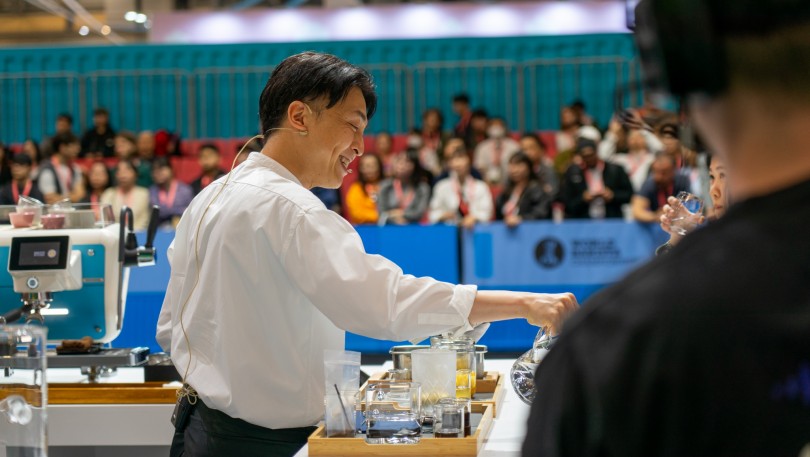

「WBC」のドリンクや素材がトレンドを作る
──3度の世界大会を経験された中で、特に今大会でバリスタという職業への視線、価値についてはどう感じられましたか?
石谷:前回の大会くらいから、やはりプレゼンテーションにみんなフォーカスしていて、ルールも変わったということは大きいですね。点数の付け方も変わりました。
それ以前は、いいコーヒーの説明をするような大会になりかけていました。それがよりバリスタのプレゼンテーションだったり、ジャッジにどういう体験をしてほしいか、というところにフォーカスされてきている気がします。やりがいもすごくあって、ルールも年々変わるので、アップデートして毎年よくなっているという実感はあります。
ルールが変わると、それがどういう意図があってそうしているのか、ということを理解して臨むのが大事です。植物性ミルクの話が一番わかりやすいと思うのですが、使わなくてもいいけれど、使ってチャレンジすることに意味があって。おいしかったら使うべきだし、おいしくなければ使わなくていいだけですから。
大会以外のマーケットでも、お客さまが求めるものも多くなっていますよね。お店としてよければ使うし、よくなければ使わない。ミルクだけじゃなくていろいろなところでも、競技会の中にそれは散りばめられているのかなと思いますし、業界全体を良くしようという雰囲気になっているのかなとは思いますね。
新しい抽出方法や品種、プロセスとかが出てくると、大会で使ったものが1年後くらいに現場にも取り入れられて、一般消費者に届くような時代になっていますから。
「WBC」を通して日本のバリスタ、世界のバリスタを知る
──今大会、日本チームは石谷さんを中心として本当に素晴らしいチームになっていたと思います。
石谷:みんなが僕のわがままを聞いてくれて、それぞれ仕事がある中で休みの時間を使ったりして練習にも付き合ってくれて、すごく助けてもらいました。
あとは、なんでも言えるというか、「これやってなかった…、やってくれる?」とすぐに言えるような、とても頼れるチームでした。適材適所というか、各々にキャラクターがそれぞれあって、得意な部分を強みとして動いてくれたので、ストレスなく大会に臨めました。
ステージに立つのは選手だけですが、やっぱり大会はチーム戦だなと思いましたね。
──戦いの後にチームと話す時間も、雰囲気が見えて面白かったです。改めて今大会に出場してよかったことはなんでしたか?
石谷:大会出場のためにコーヒーと向き合う時間を過ごす中で、まだまだ良くすることができる部分があると実感しました。練習するとできるようになってきて、できなかったことがあるということを痛感したのが新鮮だったことのひとつ。
あとは、チームで臨むことの大切さですね。大人数でのこういう経験って大人になるとなかなかできないですが、みんなでひとつの目標に向かっていくというやりがい、楽しさを体験できたことが一番大きかったと思います。一体感のある雰囲気で過ごせた経験は、どこかで生きてくるのかなと思います。
──ちなみに日本人のバリスタの海外からの評価はどんなものでしょうか?
石谷:多分、作業が丁寧だということと、シャイってことでしょうか(笑)。あとは、まだ海外で知られている日本のバリスタは少ないと感じました。僕らもWBCなどを通さないと海外のバリスタについてはなかなか知る機会がありませんよね。
でも、大会で知り合った方、名前を聞いた方がいる国に行けば、その方のお店に行ってみたいと思ったりもします。そういう意味でも、世界大会に出場することの意味はあると思いますね。
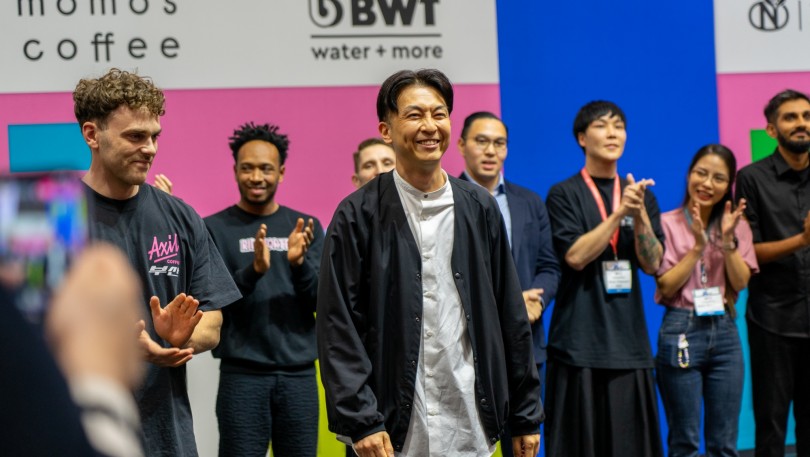

──今後の競技会への挑戦についてはどうお考えですか?
石谷:今のところは、今年は特に考えていませんが、まだ時間があるので出る目的があれば出ます。それに、どんなかたちにせよ世界大会の場にずっと携わっていきたいということは決めているというか、自然にそこにはいると思います。
──石谷さんに続く世代の日本のバリスタたちについては?
石谷:育てていかないといけないという思いもありますが、僕自身はまだそういう気持ちで他のバリスタさんを見たことはありません。たとえば、今年のJBCに出場しなかったとして、大会を外から見た時にどう思うか。やっぱり自分が参加したくなるのか、もう若い人たちに全部任せようという気持ちになるのか……。まだ1カ月しか経っていないので(試合の感覚が)抜けていない感じはありますね。
──最後に、今後の予定などをお聞かせください。
石谷:海外からの仕事の問い合わせが増えてきました。行ったことのない海外のフェスでバリスタをやるとか、また違った吸収ができるかなと思います。今年も残り半年ありますが、どんな活動ができるのか自分でも楽しみです。
石谷さん、ありがとうございました。そして改めて、おめでとうございます。
今後も石谷バリスタの活躍は続きそうです。
CROWD ROASTERでもその活動を追っていきたいと思います。
In May 2024, I participated as the Japanese representative in the "World Barista Championship (WBC)" held in Korea and was able to secure third place. After the competition, I was interviewed about the event on the coffee app "CROWD ROASTER". With permission to reprint, we are sharing that interview article here.
Barista Takayuki Ishitani, who won his third Japanese championship title at the "Japan Barista Championship (JBC)" in 2023. In May 2024, he represented Japan at the "World Barista Championship (WBC)" held in Korea and achieved his personal best, placing third among world-class baristas.For Ishitani-san himself, this was his third world challenge following 2018 and 2022. He says that this competition was more rewarding than ever before. On this day, about two weeks after the competition, we had him reflect thoroughly.


The "WBC" Atmosphere Created by Participants' Efforts
--First of all, congratulations on your third-place finish at the WBC (World Barista Championship). Please share your honest feelings.
Ishitani: Thank you very much. Honestly, I feel somewhat frustrated with the result of third place. However, I'm satisfied with the content of my performance and everything I've worked on up to this point. I was able to do everything I planned without any hitches, and I have no lingering doubts about the ranking. It was a very satisfying competition for me.
--Were there any differences compared to the two previous times you participated?
Ishitani: Maybe it's because this was my third time and I could see things more clearly, but the atmosphere was really good. Other competitors were also unanimously saying, "This competition was really great!" There's no doubt that everyone was operating with the intention of making the event better.
--Even from watching the competition videos, the excitement of the audience and the friendly atmosphere really came across.
Ishitani: This time, there was a real sense of unity in the competition. Not just the competitors, but the audience, judges, and organizers all really enjoyed the four days. I think it was a great event.
--The finalists included baristas from various countries in Asia, Oceania, and Europe.
Ishitani: Not just among the finalists, but from the preliminary round, there was an atmosphere of everyone trying to communicate with each other. That's the most enjoyable part of a world competition. Getting to know various people is one of the meaningful aspects of participating in such an event.


An Era Where Baristas Can Freely Create What They Want to Express
--About half a year has passed since the interview after your JBC victory in September 2023. What kind of preparations did you make for this competition during that time?
Ishitani: With the event being held in May, it was a delicate timing whether the new crop would be ready or not, so we couldn't predict which coffees would be available until just before the competition.
I communicated with producers, and also had MAME from Switzerland (who was part of our team this time) help with making contacts. Determining what kind of coffee would be available at the time of the competition was where I focused most of my attention. Besides that, I spent the entire six months thinking about how to shape my presentation.
--In the end, the beans used in the competition were from the same farm and variety as in the JBC.
Ishitani: Yes, we decided around March through cupping whether to use the new crop from that farm or choose another farm. I chose the same farm as JBC because I wanted to use the flavors I aimed for and the coffee I currently like.
The coffee from other farms was also good, but I had been drinking this one since the Japan competition, and I thought these two would be the best to clearly convey my presentation.
--The theme of your presentation was also the same as in JBC, wasn't it?
Ishitani: I didn't change the theme of "The happiest moment is when your ideal becomes reality." I wanted to convey not just the professional aspect of being a barista, but what kind of drink is ideal to create. The fact that this ideal has become something I can intentionally create is what I called "Intentional Craft," and I wanted to convey that this era is incredibly exciting for baristas.
--So you approached it with a consistent theme. Now, let's review each part one by one, starting with the espresso.
Ishitani: For the espresso, I blended 16g of Geisha from Finca Debora in Panama with 2g of Caturra from Finca Milan in Colombia. You can taste flavors like stone fruits and tropical fruits. My aim was to "create a perfect balance between flavor and tactile sensation."
--Next was the milk beverage. You actively used rice milk and lactose-free milk.
Ishitani: Since 2022, plant-based milk has been allowed in competitions, so I decided to try rice milk. In fact, both rice milk and lactose-free milk paired well with this drink, so I decided to use them in the competition. However, I didn't decide to use them from the start; this too was an expression of intentionally creating flavors through verification.


--Just hearing about rice-derived milk and lactose-free options, I thought you might have been conscious of social themes like environmental issues or health considerations.
Ishitani: No, if I talked about that, it would have disrupted my presentation. It was purely a selection resulting from my pursuit of flavor, trying to create the best drink with my own hands.
--Lastly, there was the signature drink.
Ishitani: For this, the ideal was to create a synergy between the Geisha and Caturra I used. It took the form of creating a drink inspired by the cocktail "Negroni".
--How did the judges react when you actually served it?
Ishitani: While the judges need to view competitors fairly, as I mentioned at the beginning, they created a really good atmosphere from the first round. So, my impression was that it was very easy to perform.


"WBC" Drinks and Ingredients Create Trends
--After experiencing three world competitions, how did you feel about the perspective on and value of the barista profession, especially in this competition?
Ishitani: Since about the last competition, everyone has been focusing on the presentation, and the change in rules is significant. The scoring method has also changed.
Before that, the competition was becoming more about explaining good coffee. Now it feels more focused on the barista's presentation and what kind of experience they want to give to the judges. It's very rewarding, and as the rules change every year, I feel that it's being updated and improving annually.
When the rules change, it's important to understand the intention behind those changes and approach the competition accordingly. The plant-based milk topic is probably the easiest to understand - you don't have to use it, but there's meaning in challenging yourself to use it. If it's delicious, you should use it; if it's not, you don't have to.
Even in markets outside of competitions, customer demands are increasing. If it's good for the shop, they use it; if not, they don't. I think this is scattered throughout the competition, not just with milk but in various aspects, and there's an atmosphere of trying to improve the industry as a whole.
When new extraction methods, varieties, or processes emerge, what's used in competitions tends to be incorporated into the field about a year later and reaches general consumers. We're in that kind of era now.
Getting to Know Japanese and World Baristas Through "WBC"
--In this competition, the Japanese team centered around you seemed to be truly amazing.
Ishitani: Everyone listened to my selfish requests, and even though they all had their own jobs, they used their free time to practice with me. They were incredibly helpful.
Also, I could say anything to them, like "I haven't done this... can you do it?" It was a very reliable team. It was like having the right person in the right place - everyone had their own character and moved using their strengths in their areas of expertise, so I could approach the competition without stress.
Only the competitor stands on stage, but the competition is really a team effort.
--The time talking with the team after the battle was interesting too, as we could see the atmosphere. Looking back, what was the best thing about participating in this competition?
Ishitani: While spending time engaging with coffee for the competition, I realized there are still areas that can be improved. It was refreshing to keenly feel that there were things I couldn't do before, but with practice, I could do them.
Also, the importance of approaching it as a team. As adults, we don't often get to experience working with a large group like this, but I think the biggest thing was experiencing the sense of purpose and enjoyment of everyone working towards a single goal. I think the experience of spending time in such a unified atmosphere will be valuable somewhere down the line.
--By the way, how are Japanese baristas evaluated overseas?
Ishitani: Probably that our work is meticulous and that we're shy (laughs). Also, I felt that there are still few Japanese baristas known overseas. We don't have many opportunities to know about overseas baristas except through events like WBC.
But if I go to a country where I've met someone or heard their name at a competition, I want to visit their shop. In that sense too, I think there's meaning in participating in world competitions.


--What are your thoughts on future competition challenges?
Ishitani: For now, I'm not particularly considering it this year, but there's still time, so if I have a purpose for participating, I will. Regardless of the form, I've decided - or rather, I naturally feel - that I want to stay involved in the world competition scene.
--What about the next generation of Japanese baristas following in your footsteps?
Ishitani: While I feel we need to nurture them, I personally haven't looked at other baristas with that mindset yet. For example, if I didn't participate in this year's JBC and watched the competition from the outside, how would I feel? Would I want to participate myself, or would I feel like leaving everything to the younger generation... It's only been a month, so I still haven't shaken off the feeling of the competition.
--Finally, could you tell us about your future plans?
Ishitani: I've been getting more work inquiries from overseas. Doing barista work at overseas festivals I've never been to before could provide a different kind of learning experience. There's still half a year left in this year, and I'm excited to see what kind of activities I can engage in.
Thank you, Ishitani-san. And congratulations once again.
It seems that Barista Ishitani's activities will continue to flourish.
We at CROWD ROASTER will continue to follow his activities.
En mayo de 2024, participé como representante japonés en el "Campeonato Mundial de Baristas (WBC)" celebrado en Corea y pude asegurar el tercer lugar. Después de la competencia, fui entrevistado sobre el evento en la aplicación de café "CROWD ROASTER". Con permiso para reproducir, estamos compartiendo ese artículo de entrevista aquí.
El barista Takayuki Ishitani, quien ganó su tercer título de campeón japonés en el "Campeonato de Baristas de Japón (JBC)" en 2023. En mayo de 2024, representó a Japón en el "Campeonato Mundial de Baristas (WBC)" celebrado en Corea y logró su mejor resultado personal, quedando en tercer lugar entre baristas de clase mundial.Para Ishitani-san, este fue su tercer desafío mundial después de 2018 y 2022. Dice que esta competencia fue más gratificante que nunca. En este día, aproximadamente dos semanas después de la competencia, le pedimos que reflexionara a fondo.


La Atmósfera del "WBC" Creada por los Esfuerzos de los Participantes
--En primer lugar, felicitaciones por su tercer lugar en el WBC (Campeonato Mundial de Baristas). Por favor, comparta sus sentimientos honestos.
Ishitani: Muchas gracias. Honestamente, me siento algo frustrado con el resultado del tercer lugar. Sin embargo, estoy satisfecho con el contenido de mi actuación y todo lo que he trabajado hasta este punto. Pude hacer todo lo que planeé sin contratiempos, y no tengo dudas persistentes sobre la clasificación. Fue una competencia muy satisfactoria para mí.
--¿Hubo diferencias en comparación con las dos veces anteriores en las que participó?
Ishitani: Tal vez sea porque esta fue mi tercera vez y pude ver las cosas más claramente, pero el ambiente fue realmente bueno. Otros competidores también decían unánimemente: "¡Esta competencia fue realmente genial!" No hay duda de que todos operaban con la intención de mejorar el evento.
--Incluso al ver los videos de la competencia, realmente se transmitía la emoción del público y el ambiente amistoso.
Ishitani: Esta vez, hubo un verdadero sentido de unidad en la competencia. No solo los competidores, sino también el público, los jueces y los organizadores realmente disfrutaron los cuatro días. Creo que fue un gran evento.
--Los finalistas incluían baristas de varios países de Asia, Oceanía y Europa.
Ishitani: No solo entre los finalistas, sino desde la ronda preliminar, había una atmósfera de que todos intentaban comunicarse entre sí. Esa es la parte más agradable de una competencia mundial. Conocer a varias personas es uno de los aspectos significativos de participar en un evento así.


Una Era Donde los Baristas Pueden Crear Libremente Lo Que Quieren Expresar
--Han pasado unos seis meses desde la entrevista después de su victoria en el JBC en septiembre de 2023. ¿Qué tipo de preparativos hizo para esta competencia durante ese tiempo?
Ishitani: Con el evento celebrándose en mayo, era un momento delicado si la nueva cosecha estaría lista o no, por lo que no podíamos predecir qué cafés estarían disponibles hasta justo antes de la competencia.
Me comuniqué con productores, y también tuve la ayuda de MAME de Suiza (que formaba parte de nuestro equipo esta vez) para hacer contactos. Determinar qué tipo de café estaría disponible en el momento de la competencia fue donde enfoqué la mayor parte de mi atención. Además de eso, pasé los seis meses enteros pensando en cómo dar forma a mi presentación.
--Al final, los granos utilizados en la competencia fueron de la misma finca y variedad que en el JBC.
Ishitani: Sí, decidimos alrededor de marzo mediante catación si usar la nueva cosecha de esa finca o elegir otra finca. Elegí la misma finca que en el JBC porque quería usar los sabores a los que apuntaba y el café que actualmente me gusta.
El café de otras fincas también era bueno, pero había estado bebiendo este desde la competencia de Japón, y pensé que estos dos serían los mejores para transmitir claramente mi presentación.
--El tema de su presentación también fue el mismo que en el JBC, ¿verdad?
Ishitani: No cambié el tema de "El momento más feliz es cuando tu ideal se convierte en realidad". Quería transmitir no solo el aspecto profesional de ser barista, sino qué tipo de bebida es ideal crear. El hecho de que este ideal se haya convertido en algo que puedo crear intencionalmente es lo que llamé "Artesanía Intencional", y quería transmitir que esta era es increíblemente emocionante para los baristas.
--Así que lo abordó con un tema consistente. Ahora, revisemos cada parte una por una, comenzando con el espresso.
Ishitani: Para el espresso, mezclé 16g de Geisha de Finca Debora en Panamá con 2g de Caturra de Finca Milan en Colombia. Se pueden saborear sabores como frutas de hueso y frutas tropicales. Mi objetivo era "crear un equilibrio perfecto entre sabor y sensación táctil".
--A continuación, estaba la bebida con leche. Utilizó activamente leche de arroz y leche sin lactosa.
Ishitani: Desde 2022, se ha permitido el uso de leche vegetal en las competiciones, así que decidí probar la leche de arroz. De hecho, tanto la leche de arroz como la leche sin lactosa combinaban bien con esta bebida, así que decidí usarlas en la competencia. Sin embargo, no decidí usarlas desde el principio; esto también fue una expresión de crear intencionalmente sabores a través de la verificación.


--Solo escuchando sobre la leche derivada del arroz y las opciones sin lactosa, pensé que podría haber sido consciente de temas sociales como problemas ambientales o consideraciones de salud.
Ishitani: No, si hubiera hablado de eso, habría interrumpido mi presentación. Fue puramente una selección resultante de mi búsqueda de sabor, tratando de crear la mejor bebida con mis propias manos.
--Por último, estaba la bebida de firma.
Ishitani: Para esto, lo ideal era crear una sinergia entre el Geisha y el Caturra que usé. Tomó la forma de crear una bebida inspirada en el cóctel "Negroni".
--¿Cómo reaccionaron los jueces cuando la sirvió realmente?
Ishitani: Aunque los jueces necesitan ver a los competidores de manera justa, como mencioné al principio, crearon un ambiente realmente bueno desde la primera ronda. Así que mi impresión fue que fue muy fácil actuar.


Las Bebidas e Ingredientes del "WBC" Crean Tendencias
--Después de experimentar tres competiciones mundiales, ¿cómo se sintió acerca de la perspectiva y el valor de la profesión de barista, especialmente en esta competencia?
Ishitani: Desde la última competencia, todos se han estado enfocando en la presentación, y el cambio en las reglas es significativo. El método de puntuación también ha cambiado.
Antes de eso, la competencia se estaba convirtiendo más en explicar buen café. Ahora se siente más enfocada en la presentación del barista y qué tipo de experiencia quieren dar a los jueces. Es muy gratificante, y como las reglas cambian cada año, siento que se está actualizando y mejorando anualmente.
Cuando las reglas cambian, es importante entender la intención detrás de esos cambios y abordar la competencia en consecuencia. El tema de la leche vegetal es probablemente el más fácil de entender - no tienes que usarla, pero hay un significado en desafiarte a usarla. Si es deliciosa, deberías usarla; si no, no tienes que hacerlo.
Incluso en mercados fuera de las competencias, las demandas de los clientes están aumentando. Si es bueno para la tienda, lo usan; si no, no lo hacen. Creo que esto está disperso por toda la competencia, no solo con la leche sino en varios aspectos, y hay una atmósfera de tratar de mejorar la industria en su conjunto.
Cuando surgen nuevos métodos de extracción, variedades o procesos, lo que se usa en las competencias tiende a incorporarse al campo alrededor de un año después y llega a los consumidores generales. Estamos en ese tipo de era ahora.
Conociendo a los Baristas Japoneses y Mundiales a Través del "WBC"
--En esta competencia, el equipo japonés centrado en usted pareció ser verdaderamente asombroso.
Ishitani: Todos escucharon mis peticiones egoístas, y aunque todos tenían sus propios trabajos, usaron su tiempo libre para practicar conmigo. Fueron increíblemente útiles.
Además, podía decirles cualquier cosa, como "No he hecho esto... ¿puedes hacerlo?" Era un equipo muy confiable. Era como tener a la persona adecuada en el lugar adecuado - todos tenían su propio carácter y se movían usando sus fortalezas en sus áreas de experiencia, así que pude abordar la competencia sin estrés.
Solo el competidor está en el escenario, pero la competencia es realmente un esfuerzo de equipo.
--El tiempo hablando con el equipo después de la batalla también fue interesante, ya que podíamos ver el ambiente. Mirando hacia atrás, ¿qué fue lo mejor de participar en esta competencia?
Ishitani: Mientras pasaba tiempo involucrado con el café para la competencia, me di cuenta de que todavía hay áreas que se pueden mejorar. Fue refrescante sentir agudamente que había cosas que no podía hacer antes, pero con práctica, podía hacerlas.
Además, la importancia de abordarlo como un equipo. Como adultos, no solemos tener la oportunidad de experimentar trabajar con un grupo grande como este, pero creo que lo más grande fue experimentar el sentido de propósito y disfrute de todos trabajando hacia un solo objetivo. Creo que la experiencia de pasar tiempo en un ambiente tan unificado será valiosa en algún momento.
--Por cierto, ¿cómo son evaluados los baristas japoneses en el extranjero?
Ishitani: Probablemente que nuestro trabajo es meticuloso y que somos tímidos (risas). Además, sentí que todavía hay pocos baristas japoneses conocidos en el extranjero. No tenemos muchas oportunidades de conocer a baristas extranjeros excepto a través de eventos como el WBC.
Pero si voy a un país donde he conocido a alguien o he escuchado su nombre en una competencia, quiero visitar su tienda. En ese sentido también, creo que hay un significado en participar en competencias mundiales.


--¿Cuáles son sus pensamientos sobre futuros desafíos de competencia?
Ishitani: Por ahora, no estoy considerando particularmente este año, pero todavía hay tiempo, así que si tengo un propósito para participar, lo haré. Independientemente de la forma, he decidido - o más bien, siento naturalmente - que quiero seguir involucrado en la escena de la competencia mundial.
── ¿Qué piensa de la generación de baristas japoneses que sigue a la suya, Sr. Ishitani?
Ishitani: Aunque siento que es necesario formar a la próxima generación, personalmente nunca he visto a otros baristas desde esa perspectiva. Por ejemplo, si no participara en el JBC (Campeonato de Baristas de Japón) este año, ¿qué pensaría al verlo desde afuera? ¿Seguiría queriendo participar yo mismo, o me sentiría listo para dejar todo en manos de los más jóvenes? Solo ha pasado un mes, así que todavía no he perdido completamente la sensación de la competencia.
── Finalmente, ¿podría contarnos sobre sus planes futuros?
Ishitani: He recibido más consultas de trabajo desde el extranjero. Trabajar como barista en festivales en el extranjero donde nunca he estado antes podría ser una nueva experiencia enriquecedora. Queda medio año de este año, y estoy emocionado por ver qué tipo de actividades podré realizar.
Gracias, Sr. Ishitani, y nuevamente, ¡felicidades!
Parece que la carrera del barista Ishitani continuará avanzando.
En CROWD ROASTER, planeamos seguir de cerca sus actividades.

